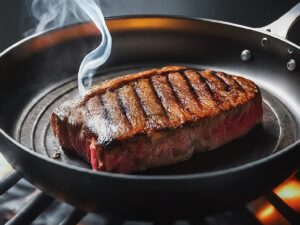As a home cook, you may have wondered whether it’s possible to use your favourite induction cookware on an electric stove. After all, if you’ve invested in high-quality cookware for your induction cooktop, it makes sense to want to use it on other stovetops as well.
In this post, I’ll explore the benefits and risks of using induction cookware on an electric stove, and provide you with some alternatives that you can consider.
What Is Induction Cooking?
Induction cooking is a method of cooking that uses electromagnetic energy to heat the cookware directly. Unlike traditional gas or electric stovetops, induction cooktops do not produce a flame or heat the surrounding air. Instead, they create a magnetic field that heats up the cookware itself. This results in faster heating times, more precise temperature control, and less waste heat.
How Does Induction Cooking Work?
Induction cooktops work by generating a magnetic field that interacts with the ferromagnetic material in the bottom of the cookware. This causes the molecules in the cookware to vibrate rapidly, creating heat. Because the heat is generated directly inside the cookware, there is no need for a separate heating element or flame.
Benefits of Induction Cooking
The benefits of induction cooking are numerous. It is faster than traditional cooking methods, allowing you to save time and energy. It is also more efficient, as it wastes less heat than gas or electric stovetops. Additionally, induction cooktops offer more precise temperature control, allowing you to cook your food exactly the way you want it. Finally, induction cookware is easy to clean and maintain, as it has a smooth, flat surface that is resistant to scratches and stains.
What is an Electric Stove?
An electric stove is a stovetop that uses electrical resistance to heat the cooking elements. These elements are typically made of metal coils that become hot when electricity is passed through them. The heat from the coils is then transferred to the cookware via conduction.
How Does an Electric Stove Work?
Electric stoves work by converting electrical energy into heat. When you turn on an electric stove, an electric current flows through the heating elements, causing them to become hot. The heat is then transferred to the cookware via conduction, which causes the food to cook.
Can You Use Induction Cookware on an Electric Stove?
Yes, you can use induction cookware on an electric stove. While induction cooktops require cookware made of ferromagnetic metals like cast iron, carbon steel, or stainless steel, electric stoves are compatible with all types of cookware including induction cookware.
Can Induction Cookware Be Used On an Electric or Gas Stove?
Yes, induction cookware can be used on any kind of stove, be it an electric or gas stove. However, it is important to note that induction cookware is designed specifically for use with induction cooktops, and may not perform as well on other types of stovetops.
Will That Damage The Cookware?
Using induction cookware on an electric stove may lead to damage to the cookware or reduce its effectiveness in induction cooking. The high heat generated by electric stovetops can create hot spots on the induction cookware, which can cause warping or melting.
Why Should You Avoid It?
In addition to the risk of damage to the cookware, using induction cookware on an electric stove may also result in uneven heating and longer cooking times. This is because electric stovetops do not provide the same level of precision temperature control as induction cooktops.
Alternatives to Induction cookware on an Electric Stove
If you want to use your favourite cookware on an electric stove, there are several alternatives you can consider:
- Traditional Cookware: Traditional cookware, such as stainless steel or cast iron, can be used on any type of stovetop, including electric stoves.
- Ceramic Cookware: Ceramic cookware is another option that can be used on electric stoves. It is durable, easy to clean, and provides even heating.
- Non-Stick Cookware: Non-stick cookware is also compatible with electric stoves. However, it is important to choose a high-quality non-stick coating that can withstand high temperatures.
Advantages of Induction Cooking
Despite the risks of using induction cookware on an electric stove, there are many advantages to induction cooking. These include:
- Faster Heating: Induction cooktops heat up faster than traditional stovetops, allowing you to cook your meals more quickly.
- Precise Control of Temperature: Induction cooktops offer precise temperature control, allowing you to cook your food exactly the way you want it. This is especially useful when cooking delicate foods, such as sauces or custards.
- Easy Cleaning: Induction cookware has a smooth, flat surface that is easy to clean and maintain. There are no grates or burners to scrub, which makes cleaning up after meals a breeze.
- Auto-Sizing Burners: Many induction cooktops have auto-sizing burners, which adjust the size of the heating element to fit the size of your cookware. This ensures that your food is cooked evenly and efficiently, regardless of the size of your pot or pan.
Conclusion
In conclusion, while it is technically possible to use induction cookware on an electric stove, it is generally not recommended. Induction cookware is designed specifically for use with induction cooktops, which means it may not perform as well on other types of stovetops. Additionally, there is a risk that the heat from the electric stove may damage the cookware or reduce its effectiveness in induction cooking.
If you want to use your favourite cookware on an electric stove, there are several alternatives you can consider, including traditional cookware, ceramic cookware, and non-stick cookware. However, if you’re looking for faster heating times, more precise temperature control, and easier cleaning, investing in an induction cooktop may be the best option for you.
FAQs
Can you use induction pans on non-induction?
Induction pans can be used on non-induction stovetops such as gas or electric stoves. However, non-induction cookware cannot be used on induction cooktops unless it contains magnetic iron or steel. While it is possible to use non-induction cookware on an induction cooktop with the help of an induction disk, it may not work as efficiently as induction-compatible cookware.
Can you use induction pans on a glass top stove?
It depends on whether the glass top stove has induction burners or not. If it does, then you can use induction pans on it as long as they are compatible with induction cooktops. To check compatibility, you can use a magnet and see if it sticks to the bottom of the pan. However, if the glass top stove does not have induction burners, then you cannot use induction pans on it.
Can I use induction cookware on a ceramic cooktop?
According to, magnetic materials like stainless steel over aluminum, cast iron, and enamel on metal are safe to use on an induction cooktop. Ceramic cookware is not naturally magnetic and cannot be used on an induction cooktop. However, according to and, you can use induction-friendly cookware on a ceramic cooktop. Therefore, it is recommended to check the manufacturer’s instructions before using any cookware on a ceramic cooktop.





